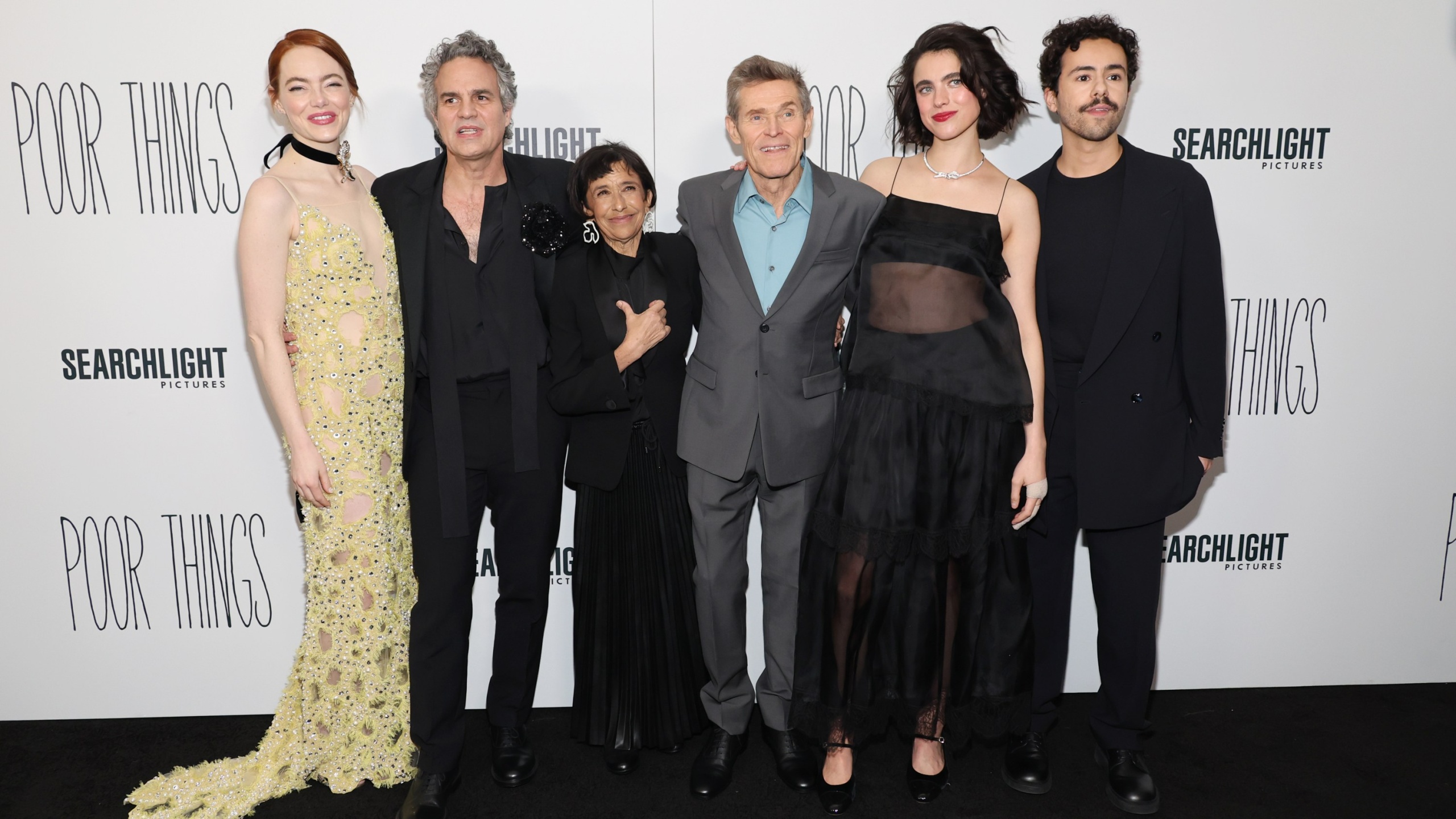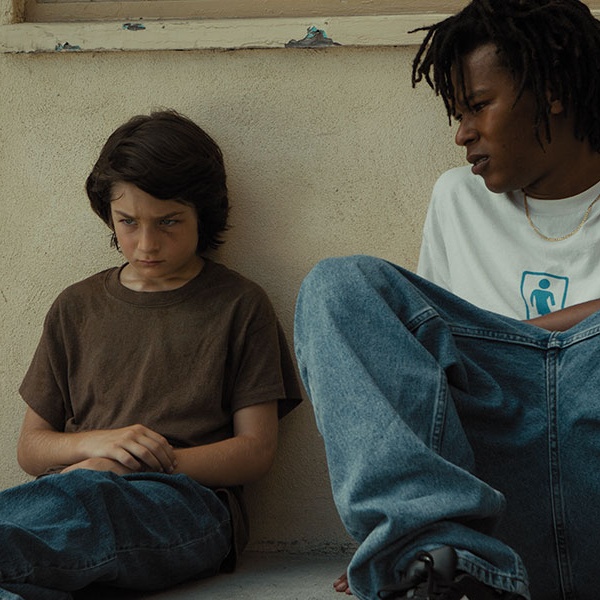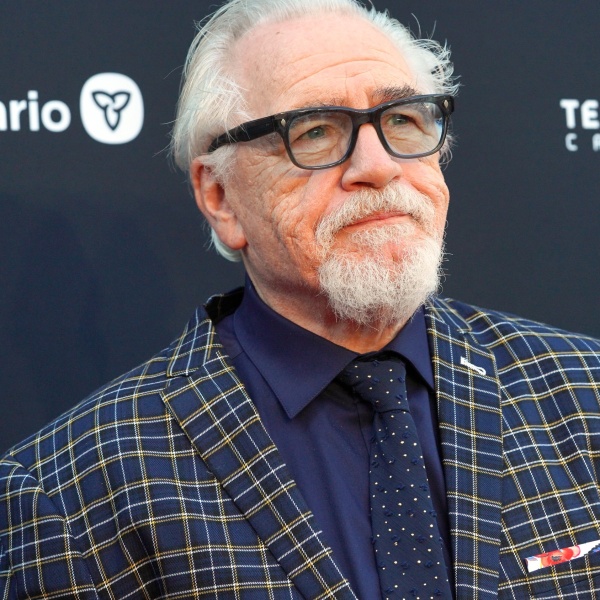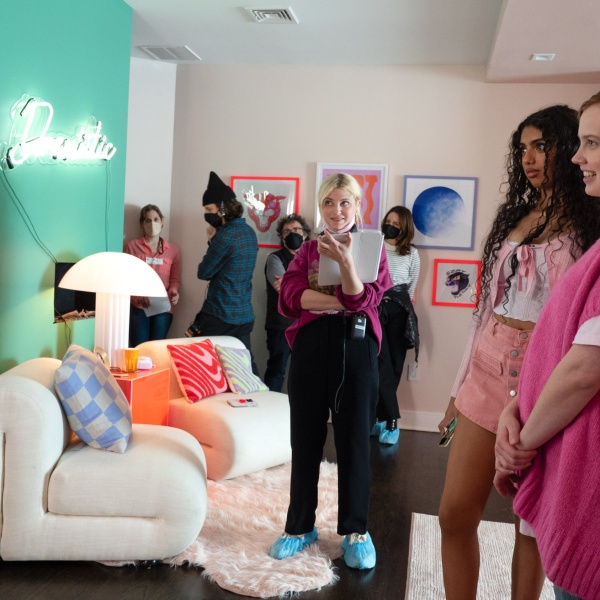
The typical “famous actor” tropes don’t apply to Willem Dafoe. Consider the start of this particular interview, just as the star of “Poor Things” was getting settled in a London hotel room, only to be surprised by a hotel employee who didn’t realize the lauded performer was a) in his room, and b) getting to work. In the background of our Zoom, the slightly concerned employee could be heard apologizing, only for Dafoe himself to apologize back, gently telling him (twice), “Don’t worry!”
Also consider the timing of the interview, the morning of the Golden Globe nominations. When I offered my congratulations on his nod in the Best Supporting Actor category, Dafoe demurred and offered a soft, “Yeah, that’s good.” And what about going up against co-star Mark Ruffalo? “I don’t like to think of it that way, but it’s good,” he said. “Because it’s for two very different roles, very different functions.” No yelling at hotel employees, graciously accepting compliments, only to defer them to his compatriots? If only all stars were like Dafoe.
It also helps that Dafoe doesn’t seem too hung up on competition (four Oscar nominations into his career, that seems like a smart way to go), especially when it comes to this film and these people. On December 8, I moderated a series of Q&As and introductions for the raucous and well-received “Poor Things,” first with just director Yorgos Lanthimos and star Emma Stone at public NYC theaters, later ending with a wide-ranging Q&A at MoMA with the entire group (Lanthimos and Stone, plus Dafoe, Ruffalo, and screenwriter Tony McNamara) for an AMPAS crowd. (They loved it.)
The group was positively giddy to reunite and chat about the film together, and Dafoe greeted Stone and Ruffalo with the kind of warm hugs normally reserved for close friends. When I mentioned to Dafoe how obvious it is they all like each other immensely, he chuckled, “It’s ridiculous!”
But as I noted that other actors often seem to particularly revere Dafoe, he demurred again. “People tend to be sweet to me,” he said. “But sometimes you hear these stories about people having problems with other actors; I don’t normally. I mean, I’ve been working for a while and I never have problems with people, so there may be something there. I don’t know. Maybe I enjoy them, that’s it.”
If people tend to be sweet to him, I pointed out, it’s probably because he’s also sweet to them. It’s a two-way street. “I try. I think it’s really important to be kind and to make people feel relaxed, because I don’t think putting the heat on them [helps the work],” Dafoe said. “Then they perform through a kind of trauma and they lose that kind of balance between being there, in control. It’s just a panic thing. It burns hot, it feels emotional, but sometimes it’s not really rooted. I think people have to help each other and people have to be, not relaxed, because I get pumped up too, but you have to feel like everybody’s working together. That’s all.”
Another thing that, perhaps unexpectedly, relaxed Dafoe? The facial prosthetics he wears as the good Dr. Godwin Baxter, who functions a bit as Dr. Frankenstein in this wily twist on the mythos (Stone’s Bella Baxter, a once-dead woman made live by the doc plugging her own baby’s brain into her adult-sized head is, of course, a very special kind of “monster”). It’s one of the first things that got him excited for the role.

“It’s as simple as, when you take [on] something that takes you away from yourself, it makes room for you to become someone else and to feel different impulses,” the actor said. “It states the terms in a very clear way. You don’t have to manufacture those terms. … I feel like it’s much better to put yourself in the situation, have the situation work on you, rather than control the situation because you want to point at something or you want to convey a message. I’ve never related to messages, I’ve related to experiences. And the quality of that experience, if you really give yourself to it, hopefully has something for people.”
He’s not just talking about people watching the final product, but also the very people he works alongside on the way there. “The other thing that, of course, is important, is even on the set, you see yourself reflected in other people’s reactions to you and how they look at you and how they deal with you,” Dafoe noted. “Because even though they know it’s just makeup, they don’t deal with you the same way [as] if you’ve got your normal face.”
Getting into the prosthetics was, as always, a process. In the early stages, Dafoe said, it would take about four hours to get everything on — including pre-made pieces the team “basically glued” onto his face, plus all the blending of makeup to make it appear seamless — and two hours to get it off. (Thank Nadia Stacey, the film’s hair, makeup, and prosthetic designer, for all the good work.)
But while other actors might balk at that sort of thing or at least bemoan the experience, Dafoe is refreshingly accepting of it. “It’s what you signed on for, and you embrace it rather than complain about, because then it really becomes painful,” he said.
His relaxed approach to it even extends to the actual work on the day. When asked how he passed those early morning hours in the makeup chair, Dafoe said he mostly mediated through it. “You can’t read, you can’t talk, and nobody wants to talk at three o’clock in the morning when everybody has been dragging their ass out of bed,” he said. “I run through my dialogue. We don’t even listen to music necessarily. Basically, I sit there and look in the mirror and count breaths and meditate and do my dialogue and try to relax. It’s a mind-bending, time-bending thing. But that’s not a bad place to start out your day.”

He added with a laugh, “It’s just like doing a yoga practice in the morning. If you do a yoga practice, I feel like, ‘Oh, I’ve done my work today, I’ve paid my way by going through this torture, and now I get to have fun.’”
A lot of that fun happened early in the process of making “Poor Things” during the rehearsals — really, more like theater games — that Lanthimos put his troupe through. Dafoe clearly loved it.
“We get in a room and we maybe warm up a little bit, and then we do theater games that involve playing around with certain skills,” he said. “It’s getting your bodies moving, getting used to touching each other, playing games with each other. The games themselves are not that interesting, but the rules that Yorgos puts on them are what make them interesting.”
The games weren’t so much about running lines or even blocking scenes but getting a certain feeling going between the group. “That also let me understand his process a little bit … learning his language and his way of being, and it just made us all safe with each other and playful and supportive,” Dafoe said. “Because when you get intimate like that and you have a common purpose and you’re all working toward something, people find their better selves. Nobody panics. To find the tone is always difficult. You had to make mistakes, you had to be foolish, you had to reach. You couldn’t be safe. You couldn’t do your shtick.”
Mostly, there was a strong sense of play, which carries over to the final film itself. Dafoe agreed. “You can understand why Yorgos was attracted to the material. You can understand why Emma was attracted to the material,” Dafoe said. “I knew why everybody was there, and you don’t always.”
Initially, the plot of “Poor Things” mirrors Mary Shelley’s iconic novel “Frankenstein”: Dr. Baxter finds Bella, experiments on her to craft a new sort of human, and is shocked by how she evolves and changes over time. But if Shelley’s Dr. Frankenstein was driven by his own God complex, there’s something else at play with Dafoe’s Godwin Baxter (who, yes, it must be noted, is frequently called “God” by Bella in the film’s early scenes; funny, right?). We soon learn, for instance, that Dr. Baxter’s own father experimented on him, thus his mangled face (and a host of other bodily issues). That puts a different, unexpectedly emotional twist on Dr. Baxter’s journey and his bond with Bella.

It was surprising to Dafoe as well, he said. “He really tries to turn his pain into a positive thing: reanimating Bella,” he said. “Dr. Baxter, you’ve got to remember, he’s isolated. Socially, people don’t want to deal with him, because he’s disfigured. His father also did experiments that make him impotent, so he’s robbed of sexuality. He’s a tragic figure, but he dedicates himself to science.”
And he dedicates himself to Bella. “While in the Frankenstein myth, Dr. Frankenstein, once the creature goes out, is repelled by him, I think Baxter falls in love with Bella actually,” Dafoe said. “It’s touching, and it’s beyond a parental thing. I think he invests himself in her. He misses her so deeply when she goes, and when he finds another woman supposedly to take her place, it’s not the same feeling.”
Sparking that level of feeling with Stone was easy, mostly because Dafoe just “likes her so much.” “When you’re actually performing, she’s got great skill and she works hard, but that’s all very private, she doesn’t wear it,” he said. “Because she’s positioned at the center of this, not only as a character but also as a producer, she kind of took everybody on, everything revolved around Emma, with Yorgos being the puppet master. But just her whole way of being, she’s generally playful. When she’s doing the hard work, she doesn’t let you know it. She’s not neurotic at all. If she has insecurities or she has struggles, she sure hides them through a lot of good humor and just applying herself. She’s generous.”
He added, “She was sweet with me, so what gives, gets.” Maybe it really can be that easy.
Dafoe is heartened by the initial response to the film (a strong limited opening last weekend, quite solid reviews), and can’t wait for it to reach a wider audience. “It’s easy to talk about the sex, it’s easy to talk about the comedy, but there are lots of other elements, and I think people are responding to that as well,” he said. “The movie is actually quite complex and is very rich, and I think for people that are game, it can really be a very strong movie, as far as how it affects your thinking. … It’s going to be different things to different people, like any good movie.”
The actor seems eager to keep that Lanthimos and Stone magic going: He’s already shot another film with the pair, the upcoming “Kinds of Kindness,” which Lanthimos co-wrote with his long-time collaborator Efthimis Filippou. “I was very happy to work with them both again, and I’m very curious to see the movie,” Dafoe said. “I think it’s safe to say it’s not at all like ‘Poor Things.’ It’s a little closer to his earlier work. It’s a smaller film, it’s present day, it’s structured differently.” (When I noted I am a massive fan of Lanthimos’ “Dogtooth,” Dafoe approvingly added, “There you go. Then you’ll probably like this movie.”)

Also on deck for Dafoe: another reunion, this time with his “The Lighthouse” and “The Northman” filmmaker Robert Eggers, who directs the star in “Nosferatu.” The actor is a little cagey about offering up too much, too early, having recently been reminded of what can happen when it comes to much-anticipated projects. “I said about two sentences about ‘Beetlejuice [2],’ and I regret that, because when there’s an interest in a film like that, it goes viral,” he said. “And then what I say as a casual comment, all of a sudden, becomes a story and they build something around it.” (Guilty as charged.)
Still, he couldn’t totally temper his excitement over being back with Eggers. “He gets better and better and better, gets more articulate, more on top of it,” Dafoe said. “He’s so clear when he works. It opens in December of next year, which is a long time away. Trying to be an optimist, I think the studio must feel very strong about it, because that’s quite a tough slot, so I’m excited about that. I saw some footage when we were shooting, and I can honestly say, visually, it was like unlike anything I have seen. … The look of it and how it was shot was extraordinary.”
Of his role, Dafoe said he’s playing “kind of a Van Helsing type of character, but not exactly. So he’s true to the source in some ways but also invented in some ways. I don’t know what else to tell!” OK, fine, a little bit more: “To see Lily-Rose Depp in some of those costumes, and some of the men, Ralph Ineson or Nick Hoult when they get in full [costume], it’s like they stepped out of a painting of that period. The look is very beautiful. I haven’t seen [final] footage, I’m going to ADR on some this week, and I’m looking forward to it.”
Sounds pretty fun.
A Searchlight Pictures release, “Poor Things” is now in select theaters, with further expansion to follow.






